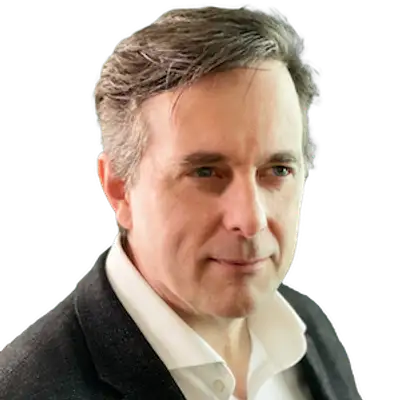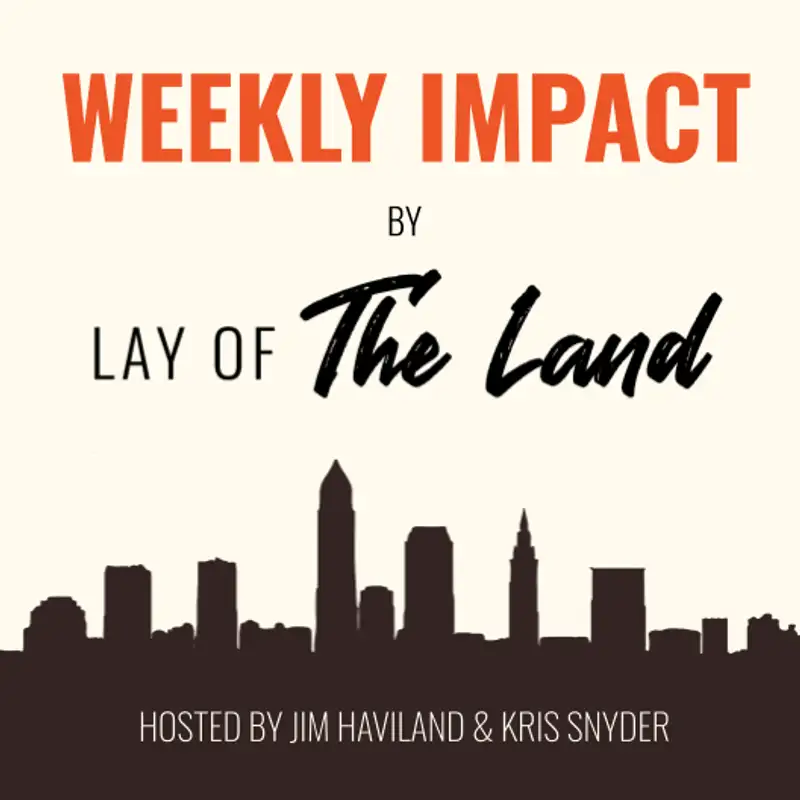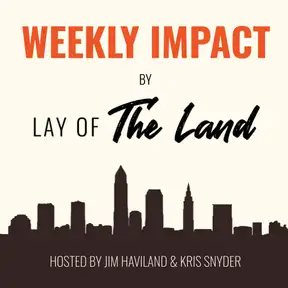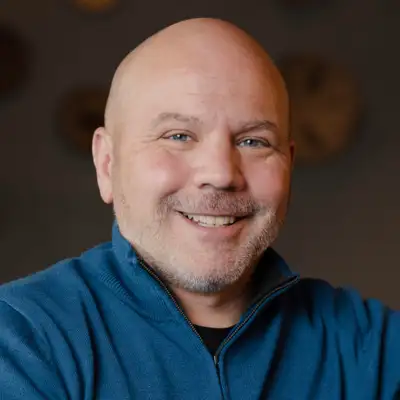xWeekly Impact 1 July 2024 Genome Oncology and Q3
Jim Haviland & Kris Snyder (00:00)
All right, we are Lay of the Land Weekly Impact for July 1st, 2024. Welcome to Q3. This is Jim Havilland. I'm Kris Snyder. And we are going at it, Chris, we got three things today. We got to talk about the new Lay of the Land podcast, an amazing one with Ian Mauer of Genome Oncology. Easy for you to say, Jim. Yeah, right. And then we'll talk a little about our sessions for the week. And then we'll talk a little about Q3.
Kris, I mean, Ian was, I think it was an amazing guest. Unlike other guests though, I mean, it was, there was a lot to learn in there. Yeah. You know, from the jump off, right? Yeah. I really found it interesting how he was describing their company as being a clinical decision support system. Right. Right. And how even at the beginning, the genesis of the organization was like, let's just go find really smart people that we can help solve problems. Right. And then we're going to learn. I love that. And learn some some and some more and keep evolving.
Yeah, yeah. I mean, so I mean, I learned, I mean, I've known about genomics for a long time. When I was at Duke, I was working with the IGSP down there when there was research coming around and we first had these human genome project. But even that's shut down because we've had so many turns of what genomics can do. And oncology, I mean, I learned about genomics, I learned about oncology, you know, just cancer in general. And then, and I learned a whole bunch about even about his explanations of AI.
I mean, he made it so clear. I mean, that's gotta be one of his magic spells that he can cast over us all. It's a great skill. Yeah, historically, I think we've said you have to hear something seven times to hear it for the first time. More recently, I heard that you should hear it 35 times because of our attention span. This got to be somewhat worse. But I do think that... Be more present, Chris. I do think, though, that his explanation of AI, maybe it was my seventh or 35th time in kind of hearing it.
And just really what it's trying to do is predict the next token. And that's it. It's the magic sauce of what we've seen, which took me to the whole thought of the way in which he keeps revisiting AI and its role in the organization. And to say that just because last quarter it couldn't do that doesn't mean this quarter it won't be able to. And it feels like an abundance -minded approach versus the scarcity -minded where people think that
you know, it's evil and it's dangerous versus it's an extension. I mean, as entrepreneurs, Jim, we've been saying for decades, right? You know, you have to do more or less forever. And one of those ways that you do it is through technology, right? And I think that's AI and machine learning in its current state is just that opportunity to think about how far can it really extend the work that we're out there doing. And it's, you know, an operating system is always about asking the right questions at the right times. And his ability to understand that he needs to
understand it enough to know where it fits in and his approach to it. I mean, anyone that wants to figure out where AI fits in their business, listen to Ian's approach here. Cause it's really, he nailed it. He asked the right question. How could this fit in and how can it help doing what we're doing? So we need like knowing that he's the reliable search engine and getting to the point where you're asking the right questions is something that maybe AI can help us. So that was brilliant. But he also found him to be Chris.
Because we work with a lot of founders. We're founders. We know founders. He's an ambitious founder. He's an ambitious founder. That is a certain kind of thing. He wasn't just a subject matter expert that wanted to do more and more of this thing. He's actually an ambitious guy. He's trying to build something. He's trying to change the world. He gets, you know, he's touched by the notion of really alleviating people of the concerns of cancer, which, you know, you know, it's mission driven, but he's, but he's impatient.
As well as someone who's a founder and ambitious founder should be
Our clients love meetings, they love our meetings, maybe teach them how to run by the time, what, they're six months in. They absolutely love them. So Ian, I'm going to be in touch. I'm going to help you get to meetings you love. You love less meetings, not more for sure. Less meetings. And he's super excited about the hard problems. That's another great thing. And the thing is he was, he's both a subject matter expert in a bunch of things. He's consciously growing that, but he's also super humble about
what he does and what he doesn't do. And this is key, if you want to be a great leader, you gotta be having the humility to be able to ask the question, like, what do I don't, I know, what haven't I figured out yet? What aren't I good at yet? Yeah, Jim Collins, right, level five leaders, that fifth level of being a level five leader is really being humble, right? Yeah. Finding the commanding and things all around you, expressing curiosity and care as you engage with others.
Just one more thing. So they also said starts only fail when someone gives up. I think that's a good call out to Simon Sinek. Infinite game. Yeah. It's either run out of will or the resource to play. Right. Right. Right. We see that all the time. Yeah. I think the, yeah, about the other humility thing is to see, Brené Brown, don't be right. Get it right.
Right. That's good. All right. So we also called out some other folks that are near and dear to to hearts. The funding for the company came early from Lee Zapis, who was on Pod # 7 of Lay of the Land, Todd Fetterman from North Coast Ventures, he went on 28, and Ray Leach and Hardick Desai I mean, a lot has changed since their Pod # 69 they're planning to come back because Ray's got some new things, Hardick's got a whole big new thing at Jumpstart.
So, but check those out, those are all good people and they get called out a lot. I was trying to search for Jumpstart and all the pods and they're like, everyone calls him out. Right. Which is great because they're part of the community. They're part of the community, yeah. They're probably been doing great stuff. All right, so Kris, let's talk about, we had a chance to meet with Society of Brands this week. Absolutely. Michael Sparrow, number 136. Number 136 and folks, what a great, great company. I have so much things, so many things I like about this. Chris, I love
the model because it's not terribly new. They're accumulating brands. That's great. But more importantly, the way they're doing it and the way they're focusing on the next thing that has to happen to get there. My experience last week, going into the session just by whatever coincidence or else in the universe, I had three people talk to me about, hey, I want to start a business and I want it to be the society brands of black.
Right. So, so like, and I told them that they were, they were so like proud of that moment. Like they've actually created something that's really interesting. Let's, let's talk about the model a little bit, Chris. Yeah. I mean, look at this, a roll up model is better.
I don't know the actual birthday of it, but it's been around for a while. I think what they're trying to do differently is, A, not remove the founder. So as much as possible, have the founders stay. Make sure that they still are a driven and vicious founder. And then give liquidity upon gates. So initially, there's some liquidity. As they continue to perform, there's more. And it can almost be prescriptive in its nature. Because so often what happens when founders stay for an earn out is there's a year to two of this.
Yeah. They're trying to make sure it's not that way for all. They want people to be excited about the work that they're going to do and the contributions they're going to make to the overall entity, not just the one. And Chris, I want to just pack that a little bit because I think that what's important there is one, a lot of people when they take venture money at some point or whatever funding model, the mistake they make is they don't take any cash off the table. Don't do that. If you're a founder, that is your moment to lock in some winnings. So don't let it all ride. Take something off the table.
It's the way to go because you're just think about portfolio management. Yes, there's times in your portfolio It's in the public markets right that you're gonna think about This is the time to get to de -risk to diversify to do those types of things that if you have the opportunity Think what's what they're trying to help these folks know that over 90 % of your wealth that you've been working tirelessly on creating is locked up in a business How do I start to have some liquidity? Yes, one of those options and one of the things that I think really I love about their model is it's a deep It's only just a deep risk, right?
but it allows them to have a higher probability of success. And the more you have shared services, whether that's the go -to -market shared services, or the operating shared services, logistical, all that comes together in a much more mature way, you're gonna get there sooner, faster. 100%. And through the miracle of investment math, everyone's multiple's worth more. The combined asset is just suddenly worth more.
Right? Everybody's all boats rise under this model. And so we've got that part of it, the investment math. We've got, you know, leave the founder in place so they have something to do with multiple exit possibilities. And the shared services model, or they're working towards a pods model, but still, you know, the notion of we can do these things, but to be very specific about the thesis and build that first. I built, you know, start with that because that's what helps bring people in and really drives the growth of the thing overall.
If a company wants to grow 5, 10, 15 % a year, then there's so much that you need to do differently than if you're trying to grow 100 plus percent. And they're in that mode where they are trying to absolutely do that through the acquisition model, coupled in with organic growth. So hats off to the ambitious three co -founders as they've come through. We didn't mention Justin, we didn't mention Sean, but obviously they're part of that, one of the actual growth.
And even the fourth member of the executive team, Jordan, I mean, this team knows the value they are creating. When we talk about with 90 OS, the idea of enterprise value being one of the key. I mean, these guys know enterprise value every day. Know exactly how to turn the knobs to actually create enterprise value. I mean, so often we see SMEs, some matter of experts in an area like this with brands. Someone actually asked me, you work with those guys? Tell me.
Are they really good at brands? It's like, no, that's not where they're good at. They're good at making this whole thing work, which is really about adding value over time. And they're getting better at brands. They have, I mean, Shawn actually, you know, has great brand, Clout, but she hasn't done, you know, 40 brands, which is where they're going to end up being. So great for that. And then, and there's some impact moments. Kris, what were they, what happened with that? Well, I think think the realization of, you know,
constant realization of what got you here won't get you there. And we were talking everything from the next level of financing and running the business and the different types of structures that could be put in place. I thought we had some really good moments. I think in the human capital side, we had some good moments where it's, you know, do you have a retention problem? Maybe, but what you definitely have is always a cultural evolution, right? And we got to keep thinking about how we evolve the culture, especially in the
dynamic business model we just talked about. Yeah, acquisitions and culture, it matters a lot. And you have to be, if you're going to be acquiring, you have to be better and better at figuring out who stays and doesn't. And just really leaning into it. It's like, hey, you've got great talents, but you no longer fit here because this is our culture. And making that just part of the reality. We're going to lose. But they did take on the notion of undesirable.
exits versus rare just exits and I think they've gotten a little bit first like my god we have retention problem well no those were all some people were not the right people in right seats. Just not the right people in right seats man and we love them and they're gonna be great somewhere else but just not here yeah and just embrace them. Well I do one of the things I love about the podcasts in general right is that we get to hear from entrepreneurs who are talking about struggles right because we know the struggle is real. Yes. So we don't really need to struggle alone there's a community out here trying to help people with stuff so.
We love the fact that society of brands has embraced the global entrepreneurial community. Yeah, reach out to us. If you want to build the society of brands of something, reach out to us. Michael is happy to talk to you. He's very generous that way. Lastly, Kris, just a couple of seconds. It is the beginning of Q3. July 1, Jim. July 1, here we are. And I know you and I are both fans of the re -forecasting concept. It's great to have to plan out your year.
You get to this place in the year, a lot of things happen those first couple of quarters. And rather than dragging yourself through hating yourself the next two quarters as you're not going to reach your goals or you're going to blow away your goals, it's time to re -forecast. And there doesn't have to be a whole group, you know, doesn't have to do everything, but like set reasonable goals so you can actually achieve them. Yeah. And it goes up and down. Yes. Even if you're ahead of plan, you want to still take a look at what's possible in the second half. You want to embrace the things that you've done well and done right. Maybe do more of them if you're winning, right? Versus operating on a plan.
that honestly is probably six months in the years, probably was done two months before that, it's eight months old. If you're an entrepreneur or a dynamic company, that's too long, right? I tell my clients, so we set that compelling audacious goal for five to 50 years out, and we have a three -year plan, and we have a one -year goal we're trying to get to. But I say, you're going to be wrong. You're not going to be 100 % right. And you're going to grade yourselves on being 90 % right on your.
on your one year plan, but even better, I just want you to get better and better at predicting. That's what I really want for you. So it's really more about being able to constantly do those cycles. So ask the right questions at all the right times. What is the most effective thing for me to do that gets us to a longer term goal the next two quarters? And that's the better question than just staying to something you put up with when you're long. All we're saying is no matter up, down on budget, take a good solid look at the second half of the year. Put together your year.
your KPI's, all those things that will still drive you to that place you need to get to. And the one plug I do want to make before we go is annual planning season is now, team. It's now, it's not October. I know that's when most of the people start to do their annual planning is in October. We got to start thinking about it now as you think about the second half, where you're going to do the work, how budgets are going to sequence and come together, all that stuff. And so often we get to the actual Q4 and people think that's annual planning. It actually starts now.
It starts now. You got to be sort of figuring this stuff out. I mean, as you're a leader rising up the hierarchy of needs, you spend more and more time thinking about that planning for that, trying to gather the information you need to make great plans for the year. And I actually have my first annual planning session in August. So, you know, because that's when they need it. They need to be able to plan for things in place. And then I got them every month through the rest of the year and into February.
Ask them the question, when do we start planning annual planning? It's like always, when you get up to the top, you're always. But even if you're just in the scalable mode, you should start now. Start thinking about it now. Kris thanks so much. Jim, enjoyed it. Thank you. See you all again soon. All right.
Creators and Guests



